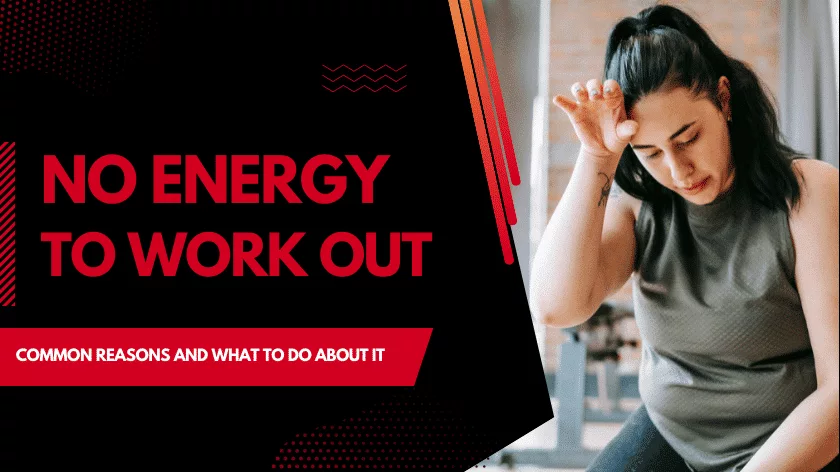How many times have you started the year with the best intentions to stick to your workout routine, only to find yourself struggling a few weeks in? You’re not alone.
There are many potential causes for waning energy levels when it comes to working out, including poor sleep, unhealthy eating habits, and even certain medical conditions.
However, there are also some simple things we can do to help increase our energy levels and get back on track with our fitness goals, including:
- Setting realistic goals
- Working out with a friend
- Finding an activity you enjoy
In this blog post, we’ll explore five common causes of having no energy to work out and what you can do about it.
Let’s get to it.
5 Common Reasons for Having No Energy to Work Out
Lack of Sleep
When we don’t get enough sleep, our bodies don’t have the time to rest properly and recover, often leading to fatigue. Ultimately, this makes finding the motivation to work out even more difficult. A lack of sleep can also lead to increased stress levels [1], which can further impact our ability to work out.
If you’re not getting enough sleep, it’s essential to make some changes to your lifestyle. Try to go to bed and wake up at the same time each day, and avoid working out late at night or right before bed.
Additionally, create a relaxing bedtime routine that will help you wind down and prepare for sleep. And finally, make sure to create a sleep environment that is dark, quiet, and cool to help you get the best night’s rest possible.
Poor Nutrition
Eating poorly can set you back when trying to live a healthy lifestyle. Not only does it make it harder to maintain a healthy weight, but it can also zap your energy levels, making it tough to stay motivated to work out.
If you’re not eating enough of the right foods, your body won’t have the fuel to power through a workout. And even if you are eating enough calories, if those calories come from unhealthy sources, your body won’t have the nutrients it needs to perform at its best.
Eating a balanced diet is the best way to make sure your body has the energy it needs to power through your workouts. Make sure you’re getting plenty of lean protein, complex carbs, and healthy fats, and you’ll soon notice the difference.
Dehydration
When you’re even slightly dehydrated, your body has to work harder to maintain its core temperature, which can result in a fall in your energy levels. Dehydration can also cause your blood volume to drop, causing your heart to work harder to pump blood to your muscles and potentially leaving you feeling tired and weak.
So before you hit the gym, make sure you’re drinking plenty of fluids. And during your workout, be sure to drink even more to stay hydrated. A good rule of thumb is to drink about 8 ounces of water every 20 minutes of exercise.
Dehydration can sneak up on you, so it’s important to be aware of the signs. These include feeling thirsty, having a dry mouth, feeling tired or lightheaded, having dark urine, or feeling dizzy. If you experience these symptoms, stop your workout and drink some fluids.
Lack of Motivation
It’s easy to let a lack of motivation get in the way of working out. After all, when you’re not motivated, it’s hard to find the energy to do anything, let alone something as physically demanding as exercise.
But here’s the thing: a lack of motivation is often the result of a lack of physical activity. In other words, the more you move, the more motivation you’ll have.
It might not seem like it initially, but trust me, it’s true. Exercise releases endorphins, which have mood-boosting and energizing effects. So even if you don’t feel like working out, just getting started can help you get into the groove and feel more motivated.
Finding an activity you enjoy is essential, so you’ll be more likely to stick with it. If you hate running, don’t force yourself to do it just because you think it’s “good for you.” Find an activity you can look forward to that doesn’t feel like a chore.
There’s no magic formula for getting motivated to work out. But if you start small and find an activity you enjoy, you’ll be more likely to stick with it and see results. And that’s motivation in itself!
Over-Training
Overtraining is a common problem among athletes and can have a number of negative consequences, including a decrease in performance and an increased risk of injury. One of the most common symptoms of overtraining is a lack of energy, which can make it difficult to train effectively.
If you’re tired and run down, taking a step back and assessing your training regimen is important. Are you doing too much? Are you giving your body enough time to recover between workouts? If you’re not sure, it’s always best to err on the side of caution and back off from training for a bit.
Ultramodern Stim-Free Energy.

Looking to surge your energy levels without the caffeine crash? Performance Lab Energy is here to help! Clean – no caffeine, no additives, just pure plant-based energy. Order today and feel the difference!
How to Get Back On Track With The Gym
It happens to the best of us. You start the year with all the best intentions, vowing to hit the gym several times a week and get back in shape. But then, life happens.
You get busy at work, you have a few too many social commitments, and suddenly working out falls by the wayside. Before you know it, months have passed, and you haven’t set foot in the gym.
If this sounds like you, don’t despair. It’s actually not that difficult to get back on track with your workout routine. Here are a few tips to help you get started:
- Set realistic goals. Don’t try to do too much too soon. If you’ve been inactive for a while, your body isn’t going to be able to handle a strenuous workout regimen right away. Start slow and gradually increase the intensity of your workouts as your body adjusts.
- Find a workout buddy. It’s always more motivating to work out with a friend. Not only will you be more likely to stick to your routine, but you’ll also have someone to help push you when you’re feeling lazy.
- Make it convenient. Find a gym close to your home or work so it’s easy to fit a workout into your schedule. You’re less likely to go if you have to drive to the other side of town to get to the gym.
- Set aside time for yourself. Working out should be a priority, not an afterthought. Schedule time for your workouts just like you would any other important appointment.
- Find an activity you enjoy. If you hate running on the treadmill, don’t do it! There are so many different types of workouts to choose from, so find one that you actually enjoy, and you’ll be more likely to stick with it.
- Be patient. Getting results takes time, so don’t get discouraged if you don’t lose 10 pounds in your first week back at the gym. Just focus on being consistent, and the results will come.
- Reward yourself. Every time you hit a milestone, give yourself a small reward. This could be something as simple as a new workout outfit or a massage.
Getting back on track with your workout routine doesn’t have to be complicated. Just start slow, set some goals, and find a way to make it work for you. You’ll be back in the gym in no time!
Final Thoughts
Having no energy to work out is incredibly frustrating, especially if you set your sights on reaching your next fitness goal.
Luckily, following the tips outlined throughout this article will ensure you’ll soon be on the right path.





Leave a Reply